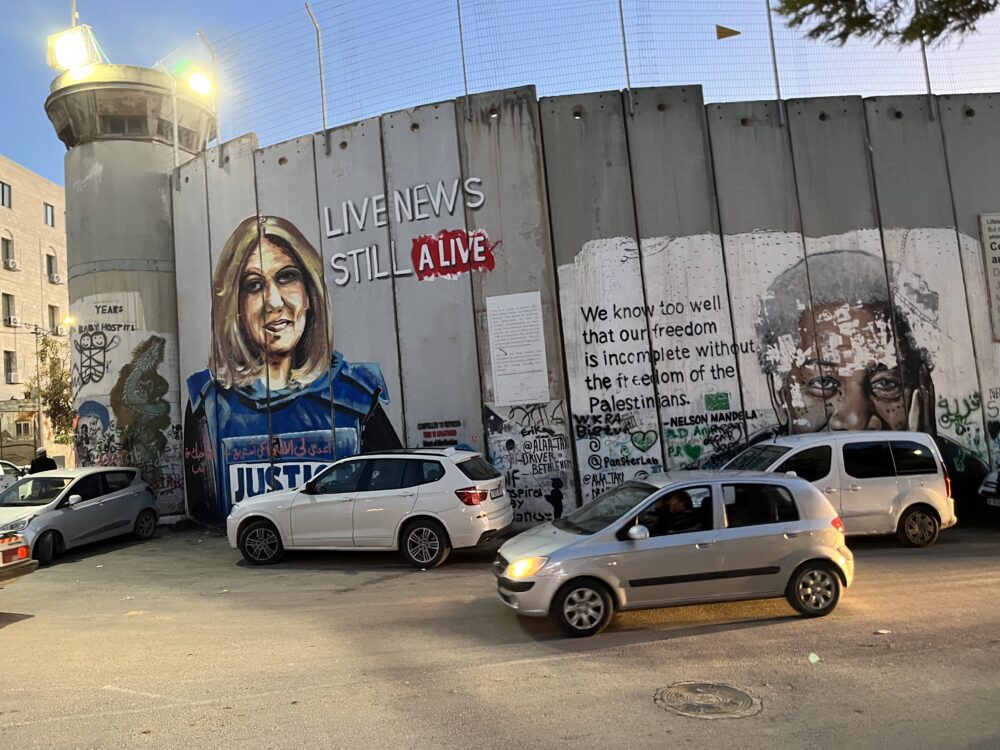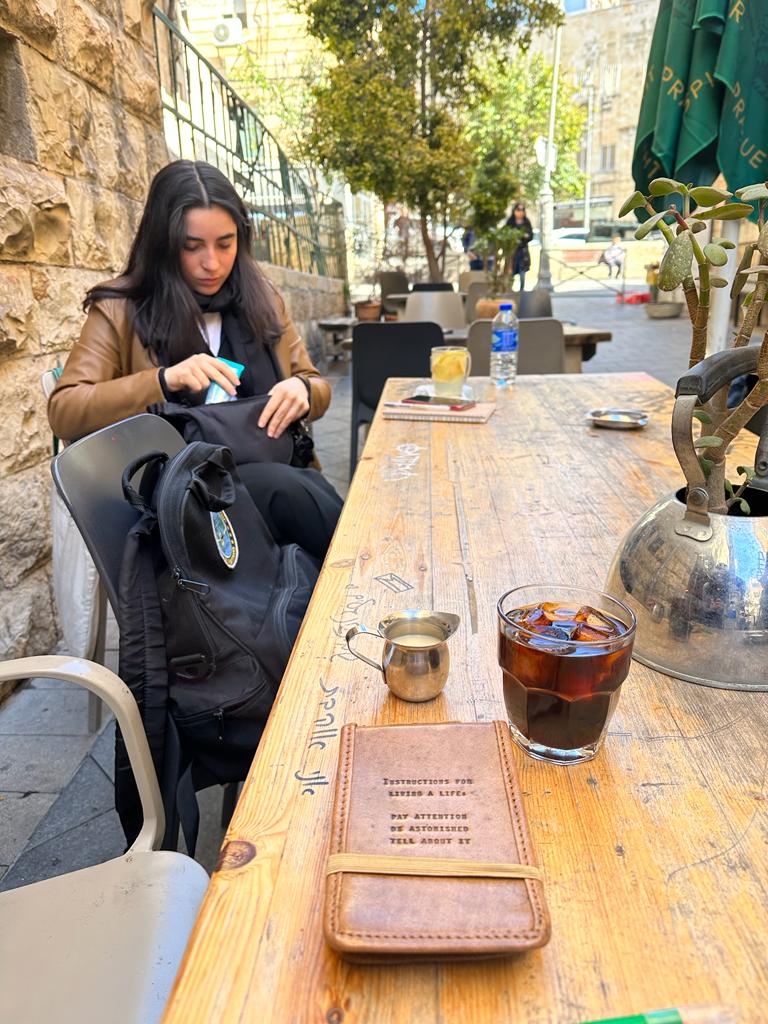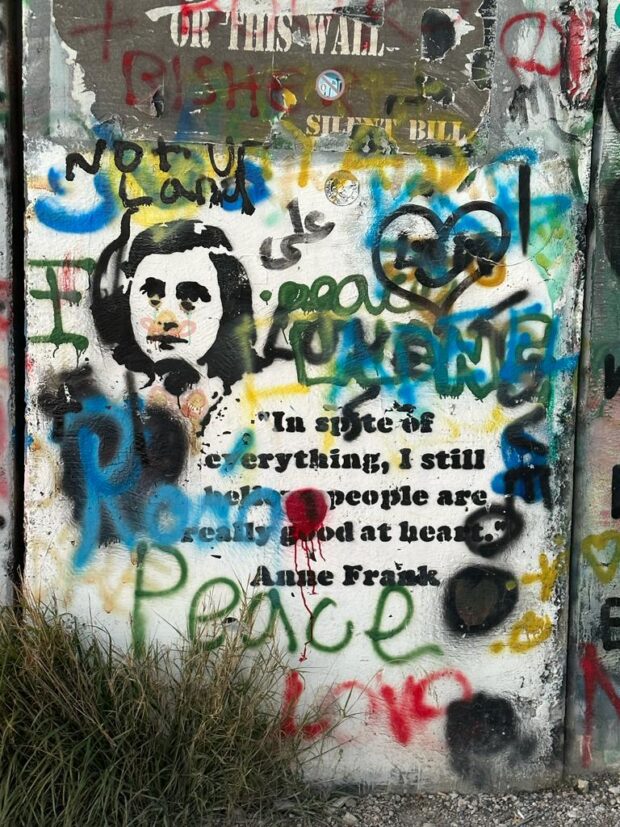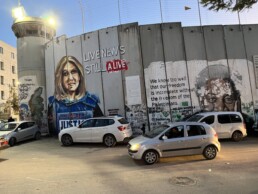Day 5: Reporting in Jerusalem, and a View Behind the Wall

After days of gloomy skies, the sun returned to Bethlehem and Jerusalem, just in time for our first day of solo reporting. Most of us boarded our faithful steed, a bus we now call ‘Lilian’ at 9 AM (not so) sharp, and headed into Jerusalem. This morning also marked the first instance that our group was stopped by Israeli border police as we crossed from Bethlehem —land controlled by the Palestinian Authority — to Jerusalem. A man and a woman in green uniforms boarded our bus and requested our passports. After they made sure we all had identification, we made it across.
Before going our separate ways, a group of us followed our guide, Eli Philip, to Cafe Sira in Center City. Following a heavy few days of intense conversations, it was a refreshing break to sip on iced coffee and lemon tea, share sandwiches and chat at a table outside, relishing the sunshine that had evaded us the past two days. It was a busy day for all; students Kelly Waldron, Henrietta McFarlane, Greg Dobak and Hanna Nebiyu Vioque visited the Orthodox Jewish neighborhood.

Nebiyu Vioque went to the Ethiopian sector of the Church of the Holy Sepulchre, a small, sectioned-off area on the roof of the church. Nebiyu Vioque comes from an Ethiopian family, but struggled to communicate with the priest, who spoke only Amharic. She called her father, who is fluent in the language. Over the phone, he stepped in as an impromptu translator, while also engaging in an animated, laughter-filled conversation with the priest. By the end of the phone call, Nebiyu Vioque’s father was brought to tears, she told me. It’s significant to him and other religious Ethiopians that they have representation in the Holy Land, she explained.
Waldron, a native of Ireland, was invited to celebrate St. Patrick’s Day at the Representative of Ireland’s residence in Sheikh Jarrah in East Jerusalem, where she mingled with other Irish citizens in the region. Waldron discovered the ambassador, Don Sexton, lived 20 minutes away from her family in Ireland.
While a few students stayed in Jerusalem until evening, most of our group headed to the museum of street artist Banksy’s Walled-Off Hotel, stopping first to walk along the adjacent Israeli wall, which the Israeli government began building in 2004, to block the main road from Bethlehem to Jerusalem in response, Israel says, to a wave of suicide attacks.

On the other side of the massive, graffiti-filled structure, is the tomb of Rachel, a matriarch from the Old Testament. Scripture says she died on a journey and was buried in Bethlehem, making her final resting place a holy site for all Muslims, Christians and Jews. Yet because of the wall, Palestinians don’t have access to the tomb.
The atmosphere in our group noticeably shifted as Philip guided us along the wall. It’s mostly covered with graffiti style-artwork, an initiative led by the infamous anonymous artist, Banksy. “Free Palestine,” “I Was An Angel And They Tear-Gassed Me”, “Forget Not the Tyranny of this Wall, Nor the Love of Freedom that Made it Fall,” were among the quotes that induced the pensive silence in our group. Right as we reached the street corner, and the Banksy Hotel was back in sight, we paused at a portrait of Holocaust victim Anne Frank, captioned with her famous quote, “In spite of everything, I still believe people are really good at heart.” A moment later, the sound of the Muslim call to prayer filled the streets. We stood transfixed, listening to the sound of the ritual and watching as the evening sun dipped behind the wall.
When we entered the Walled Off Hotel, we navigated through the museum inside, which explains the history of the wall, and the displacement and human rights violations Palestinians experience because of its existence. A video in the exhibit explained it simply: one persecuted group found its home, another lost its own. The United Nations asserts that the wall is illegal under international law and that Israel must stop building it and pay reparations to the Palestinian people. This was almost 20 years ago. “If you’re not completely baffled, you don’t fully understand,” a sign read.
With teary eyes and heightened emotions, we left the site and headed to dinner in Bethlehem with Reverend Sally Azar, the first ordained Palestinian woman. We ate hummus, salads and the traditional Arabic meal of mussakhan, then moved to a separate room for tea and a conversation with the pastor. She tells us she’s heard about all of the sites we’ve seen and is familiar with the emotions we’re experiencing.
“It’s something I experience everytime I come back,” she said.
Azar spent eight years studying theology in Germany and Lebanon before returning to Israel/Palestine in January and becoming an ordained pastor. As the conversation shifted to the wall, she shared her own personal experiences with it. She tells us it sometimes takes her hours to commute between Bethlehem and Jerusalem, a drive that took us 45 minutes that day. Still, she’s one of the luckier ones; a lot of Palestinians can’t legally travel between the two cities.
Palestinians “feel like second class citizens,” she said.
Choking up, Azar shared that the already-small Christian-Palestinian community dwindles more every day.
“I love my country, I love its people and I want to be there for them,” she said. “But at the same time, what can I tell them? Please stay?”
She emphasized her optimism in spite of increasing challenges as a stateless person and spiritual leader. “We always say hope is what the Palestinian people carry. If a Palestinian lost his or her hope, what's left?” she said.
“There are others still fighting and speaking out every day. It’s hopeful that social media has been helpful to raise more awareness. Our voices are sadly not heard, but we hope you and others can share our voices,” she said.
Resolved with this point of no resolve, we zipped up our coats and stepped outside into the darkness of Bethlehem.

